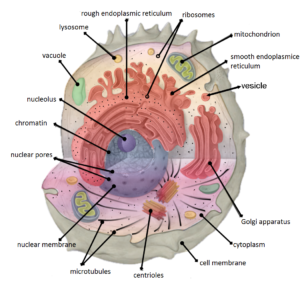
This Cells Are Us module has five units of instruction that focus on the processes that cells must perform. The first unit is an introduction of the levels of organization in living systems, followed by four other units based on the main functions that cells must perform. Rather than discuss cells from the basis of their anatomy (membranes, mitochondria, nucleus, etc.), we thought it would be more interesting to emphasize what cells DO and why and how they do it. Clicking on the unit titles will take you to the topic. These units include an interactive PowerPoint presentation, pre- and post-tests in multiple formats for varied delivery methods, a self-study game, note-taking outline, and multiple activities to reinforce and enrich the content of the lessons.
Standards Aligned: Each unit is aligned to the NGSS and TEKS for both middle school science and high school biology, as appropriate for the lesson content. A document included with each unit provides the standards for that unit.
Each module has a “Hazards” section that presents environmental hazards (such as aflatoxins, fungicides, prions, and so on).
You may go through the units in any sequence, but we suggest first exploring Unit 1, Levels of Organization. After that, the sequence does not matter.
Each instructional unit includes topics on:
- Introduction
- “Why Does It Matter” to explain the significance of the subjects
- “How We Know” to explain how under-standing develops
- “What We Know” to summarize the main facts
- “Story Time” a short bio sketch on famous scientists, emphasizing, where possible, their childhood
- Activities, Assignments for hands-on learning
- Major Hazards
- Interactive self-study game
- Interactive flash cards for self-study
Levels of Organization
Gateway to the Cell
Meeting the Cell’s Energy Needs
Building Proteins
From Genes to Proteins
Levels of Organization
Presentation
Notes
Activities
- Activity 1 – Organizing Structures and Functions: Download Document or View Google Doc
- Activity 2 – Cells on Mars?: Download Document or View Google Doc
Teacher Materials
- TEKS and NGSS Document: Download Document
- Notes outline key: Download Document or View Google Doc
- Activity Sheets: Download Document
- Pre-Test Presentation: Download PPT or View Google Slides
- Post-Test Presentation: Download PPT or View Google Slides
- Pre and Post Test Keys: Download Doc or View Google Doc
Gateway to the Cell
Presentation
Notes
Activities
- Activity 1 – How Membranes Form (All by Themselves!): Download Document or View Google Doc
- Activity 2 – The Effect of Alcohol and Tobacco on Living Cells: Download Document or View Google Doc
- Activity 3 – Think About It!: Download Document or View Google Doc
Teacher Materials
- TEKS and NGSS Document: Download Document
- Notes outline key: Download Document or View Google Doc
- Activity Sheets: Download Document
- Pre-Test Presentation: Download PPT or View Google Slides
- Post-Test Presentation: Download PPT or View Google Slides
- Pre and Post Test Keys: Download Doc or View Google Doc
Meeting the Cell’s Energy Needs
Presentation
Notes
Activities
- Activity 1 – How Many Calories in a Nut?: Download Document or View Google Doc
Teacher Materials
- TEKS and NGSS Document: Download Document
- Notes outline key: Download Document or View Google Doc
- Activity Sheets: Download Document
- Pre-Test Presentation: Download PPT or View Google Slides
- Post-Test Presentation: Download PPT or View Google Slides
- Pre and Post Test Keys: Download Doc or View Google Doc
Building Proteins
Presentation
Notes
Activities
- Activity 1 – Modeling the Structure of Protein: Download Document or View Google Doc
- Activity 2 – The Denaturing of Proteins: Download Document or View Google Doc
Teacher Materials
- TEKS and NGSS Document: Download Document
- Notes outline key: Download Document or View Google Doc
- Activity Sheets: Download Document
- Pre-Test Presentation: Download PPT or View Google Slides
- Post-Test Presentation: Download PPT or View Google Slides
- Pre and Post Test Keys: Download Doc or View Google Doc
From Genes to Proteins
Presentation
Notes
Activities
- Activity 1 – Secret Codon Write a Message in DNA!: Download Document or View Google Doc
- Activity 5 – Squishy Strawberry Science: Download Document or View Google Doc
Teacher Materials
- TEKS and NGSS Document: Download Document
- Notes outline key: Download Document or View Google Doc
- Activity Sheets: Download Document
- Pre-Test Presentation: Download PPT or View Google Slides
- Post-Test Presentation: Download PPT or View Google Slides
- Pre and Post Test Keys: Download Doc or View Google Doc

Teacher's Note
These modules are designed to be used by middle and high school students. The interactive PowerPoint documents are developed to be student-centered and self- guided. The note-taking outlines go along with the PowerPoint presentations and focus on materials that are required in the NGSS and TEKS standards. The pre- and post- tests are developed to prepare students for the types of questions that they might encounter on standardized tests. There are many higher level questions included in the presentations and the activities that encourage students to critically analyze the content. Full teacher instructions are included in each unit.
